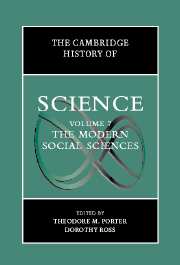Book contents
- Frontmatter
- 1 Introduction: Writing the History of Social Science
- PART I SCIENCES OF THE SOCIAL TO THE LATE NINETEENTH CENTURY
- PART II THE DISCIPLINES IN WESTERN EUROPE AND NORTH AMERICA SINCE ABOUT 1880
- PART III THE INTERNATIONALIZATION OF THE SOCIAL SCIENCES
- PART IV SOCIAL SCIENCE AS DISCOURSE AND PRACTICE IN PUBLIC AND PRIVATE LIFE
- 30 The Uses of the Social Sciences
- 31 Managing the Economy
- 32 Management and Accounting
- 33 Polling in Politics and Industry
- 34 Social Science and Social Planning During the Twentieth Century
- 35 Social Welfare
- 36 Education
- 37 The Culture of Intelligence
- 38 Psychologism and the Child
- 39 Psychiatry
- 40 Gender
- 41 Race and The Social Sciences
- 42 Cultural Relativism
- 43 Modernization
- Index
- References
36 - Education
from PART IV - SOCIAL SCIENCE AS DISCOURSE AND PRACTICE IN PUBLIC AND PRIVATE LIFE
Published online by Cambridge University Press: 28 March 2008
- Frontmatter
- 1 Introduction: Writing the History of Social Science
- PART I SCIENCES OF THE SOCIAL TO THE LATE NINETEENTH CENTURY
- PART II THE DISCIPLINES IN WESTERN EUROPE AND NORTH AMERICA SINCE ABOUT 1880
- PART III THE INTERNATIONALIZATION OF THE SOCIAL SCIENCES
- PART IV SOCIAL SCIENCE AS DISCOURSE AND PRACTICE IN PUBLIC AND PRIVATE LIFE
- 30 The Uses of the Social Sciences
- 31 Managing the Economy
- 32 Management and Accounting
- 33 Polling in Politics and Industry
- 34 Social Science and Social Planning During the Twentieth Century
- 35 Social Welfare
- 36 Education
- 37 The Culture of Intelligence
- 38 Psychologism and the Child
- 39 Psychiatry
- 40 Gender
- 41 Race and The Social Sciences
- 42 Cultural Relativism
- 43 Modernization
- Index
- References
Summary
The social sciences developed from a philosophic tradition with a keen interest in education. Philosophers looked to education for evidence about human nature and viewed education as an arena for the shaping of individual character and the strengthening of social bonds. As a consequence, education was intertwined with the broad questions that social scientists inherited from philosophy: What is human nature? How is it formed? Can it be changed? How can we explain differences among humans? How and why are societies formed? What are the best forms of social relations? How can social ties be created and maintained?
Despite the centrality of education to the concerns of the social sciences, social scientists’ interest in education has waxed and waned. The first generations of social scientists viewed education as a laboratory in which to explore social and psychological theories, an outlet for the practical application of their new knowledge, and an instrument for social and political reform. This early enthusiasm faded, however, as the socialsciences became professionalized over the twentieth century. Since the 1920s, social scientists’ association with education has been haphazard. At times, education has been at the fore-front of the disciplines’ research agendas, but more often it has receded to the periphery.
This inconstant relation has been influenced by a number of factors, including social scientists’ integration into universities, their changing attitudes towards activism,the relation of universities to schools and the training of teachers, and the development of education as an independent field of research. Because these conditions vary from nation to nation, the relation between the social sciences and education has developed differently across countries.
- Type
- Chapter
- Information
- The Cambridge History of Science , pp. 621 - 634Publisher: Cambridge University PressPrint publication year: 2003
References
- 2
- Cited by

